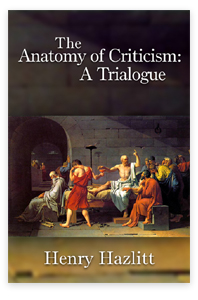
“The present cannot really be known or understood except through the past. It follows inescapably that the more we know of the past the more we know of the present. As T.S. Eliot has . . . said, the poet is not likely to know what is to be done unless he lives in what is not merely the present, but the present moment of the past, unless he conscious, not of what is dead, but of what is already living.”
“I sometimes think with Oscar Wilde that lying, the telling of beautiful untrue things, is the proper aim of art.”
Do these two passages have a faint Frygian ring to them? They are from Anatomy of Criticism. Not Frye’s Anatomy but The Anatomy of Criticism by Henry Hazlitt, pp. 155 and 239.
While on the topic––In 1982 Wayne Booth wrote to Frye to apologize for listing Anatomy of Criticism as The Anatomy of Criticism in the bibliography of The Rhetoric of Fiction, saying that it would be corrected in the next edition. Frye replied: “Well, I don’t suppose it did any harm to either book to have mine listed as “The” Anatomy for a brief time. Most people when speaking to me about it say ‘your Anatomy,’ which is much more disconcerting. In the meantime, I am very pleased that ‘The’ Rhetoric of Fiction continues to do so well.”

Bob’s account of the exchange between Frye and Booth is a fascinating snapshot of an encounter between two great critics; a bit like the camera catching Tom Brady and Peyton Manning chatting before a game. And then I thought of the extent to which some critics had a kind of celebrity status, at least within the academic world, in the 1980s. One reviewer referred to Imre Salusinszky’s 1987 collection of interviews with various critics as the first hard-cover theory fan magazine, which did not do justice to an excellent book, but which probably did reflect the way that many of us read it (and looked at the photos).
Which made me wonder which critics, if any, have the same wide appeal today. Is literary studies too fragmented into subdisciplines and competing approaches for anyone to be able to have this authority now, or could another _Anatomy of Criticism_ or _Rhetoric of Fiction_ come along, another book that everyone has to read and discuss?
The late Edward Said was one such figure: _Culture and Imperialism_ was published by a commercial press and must have sold widely, following on the immense influence of _Orientalism_. Terry Eagleton’s books also have a considerable profile.
I’d be very interested to hear what others think.